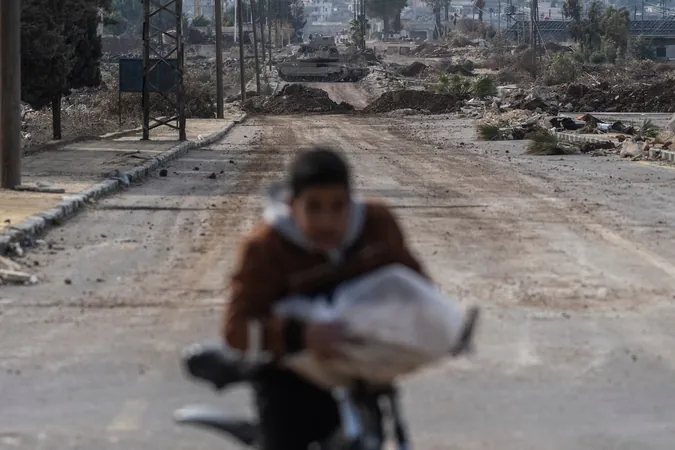
Residents of Quneitra Struggle Against Israeli Advances Amid Frustration and Despair
2025-01-06
Author: William
In the provincial capital of Quneitra, situated in southern Syria, a key road has become a makeshift barricade, obstructed by heaps of dirt, toppled palm trees, and remnants of a traffic light pole. Beyond these barriers, an Israeli tank can be seen moving ominously through the streets, a stark reminder of the escalating tensions in a region that is supposed to be a UN-patrolled buffer zone established by a 1974 ceasefire between Syria and Israel.
Following the recent fall of President Bashar Assad amidst Syria’s protracted civil war, Israeli forces have made incursions into the region, alarming locals and provoking protests. Residents report that these incursions have led to the destruction of homes and have impeded agricultural activities, with Israeli troops often firing upon demonstrators seeking to defend their rights.
Among the frustrated voices is Rinata Fastas, a resident of Salam City (formerly Baath City). She reports that while Israeli forces have not yet invaded residential areas, their advances instill fear that they may soon attempt to permanently occupy the territory. Israeli control of the Golan Heights, captured in the Six-Day War of 1967, remains controversial, with the international community widely viewing it as occupied territory, except for the United States.
Fastas acknowledges the current challenges facing Syria's government in its struggle to rebuild from the devastation of war, yet she questions why the new leadership is silent on the repeated violations in Quneitra province. This sentiment resonates deeply among the locals, who feel abandoned in their plight.
Israeli officials, on the other hand, justify their presence in Syria, framing it as a necessary measure to counter threats from Iranian-backed forces and to prevent potential cross-border attacks following recent escalations in Gaza. The rhetoric continues to paint the new Syrian leadership, with its links to extremist factions like Hayat Tahrir al-Sham, as a security threat.
Amidst these confrontations, the United Nations has condemned Israeli actions as violations of the 1974 ceasefire. Israeli Prime Minister Benjamin Netanyahu has firmly stated that troops will remain in the region until a robust security arrangement is established.
As Syrian leadership attempts to strengthen its grip over the country and establish a national army from the fragmented rebel groups, the plight of residents in Quneitra has been largely overlooked. Ahmad al-Sharaa, the effective ruler and head of Hayat Tahrir al-Sham, has made statements indicating a desire for peace with Israel, yet local civilians question the sincerity of this promise as they face daily harassment.
In Rafid, a village within the buffer zone, destruction is evident, with reports of civilian homes and an army outpost being razed by Israeli forces. Mayor Omar Mahmoud Ismail has shared experiences of his confrontations with Israeli soldiers, expressing his disbelief at their claims of friendship amidst occupation.
Tragic accounts surface, such as that of Abdelrahman Khaled al-Aqqa, an 18-year-old who was shot in both legs during a peaceful protest against the Israeli advances. His defiant chant, “Syria is free, Israel get out!” captures the sentiment of many youth in the region who feel compelled to take a stand despite the risks.
During the December 25 protests, witnesses reported injuries among demonstrators, alongside claims from the Israeli military that warning shots were intended to disperse crowds rather than cause harm. The story of Moutasem al-Ali, recovering from gunshot wounds at a hospital, further highlights the human cost of this conflict.
Calls from the residents of Quneitra for international support and intervention echo through their communities, but the prospects for change remain grim as Syria grapples with rebuilding and establishing order. Residents assert that while they desire to reclaim their rights and territory, the ongoing efforts to rebuild a nation from the ashes of war render military confrontation with Israel unviable.
As these struggles unfold, the plight of the people in Quneitra serves as a haunting reminder of the broader consequences of prolonged conflict and geopolitical instability in the region.



 Brasil (PT)
Brasil (PT)
 Canada (EN)
Canada (EN)
 Chile (ES)
Chile (ES)
 Česko (CS)
Česko (CS)
 대한민국 (KO)
대한민국 (KO)
 España (ES)
España (ES)
 France (FR)
France (FR)
 Hong Kong (EN)
Hong Kong (EN)
 Italia (IT)
Italia (IT)
 日本 (JA)
日本 (JA)
 Magyarország (HU)
Magyarország (HU)
 Norge (NO)
Norge (NO)
 Polska (PL)
Polska (PL)
 Schweiz (DE)
Schweiz (DE)
 Singapore (EN)
Singapore (EN)
 Sverige (SV)
Sverige (SV)
 Suomi (FI)
Suomi (FI)
 Türkiye (TR)
Türkiye (TR)
 الإمارات العربية المتحدة (AR)
الإمارات العربية المتحدة (AR)